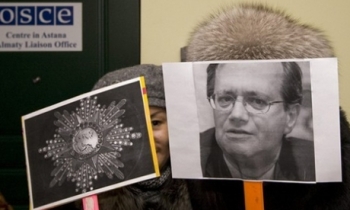There are many shortcomings in the recent amendments to the Criminal Code of Kazakhstan related to defamation and insult. The Kazakh authorities have failed to fulfill their pledges to improve the legal framework for media and protect the right to freedom of expression as made prior and during its chairmanship of the Organization of Security and Cooperation in Europe (OSCE), according to ARTICLE 19.
“ARTICLE 19 has repeatedly called on the Kazakhstan authorities to decriminalise defamation and address the shortfalls in their laws concerning free expression. We followed the media reform activities of the government throughout 2010 when Kazakhstan chaired the OSCE and provided comments on how to bring the legislation in line with international standards. That is why we are alarmed at the nature and scope of the Criminal Code changes introduced in January 2011 and consider that they will not improve the situation of the media and journalists in the country,” said Dr Agnès Callamard, ARTICLE 19 Executive Director.
ARTICLE 19 has reviewed the amendments to the Criminal Code from January 2011 that preserve criminal liability for defamation and insult. Novelties to the legislation concern administrative liability for both acts and the rule that offenders should be held administratively responsible before being punished under Criminal Code. The main concerns include:
- The new regime of prior administrative responsibility, existing only in few former Soviet Union states, treats defamation and insult as infringements on public rather than private relations. It violates the constitutional principle of equal treatment before the law in as much as for the same act some individuals can be held responsible under Criminal Code while others are held responsible under the Code of Administrative Offences
- The regulation of defamation and insult is ambiguous. Although the new regime stipulates that individuals responsible for defamation and insult are administratively liable, the Code of Administrative Offences does not define offences of defamation and insult;
- The amendments fail to remove higher protection for public officials and to reduce the harsh penalties. The president, MPs and state officials are still given higher protection against defamation and insult. The Criminal Code penalties for defamation remain harsh.
The changes to the Criminal Code will not have a positive effect on free expression unless defamation and insult are decriminalized. ARTICLE 19 calls on the Kazakhstan Government to adopt a comprehensive amendment to its criminal law to implement its commitments to freedom of expression. We also call on international and national organisations to monitor the application of the new regulation of defamation and insult in Kazakhstan.









